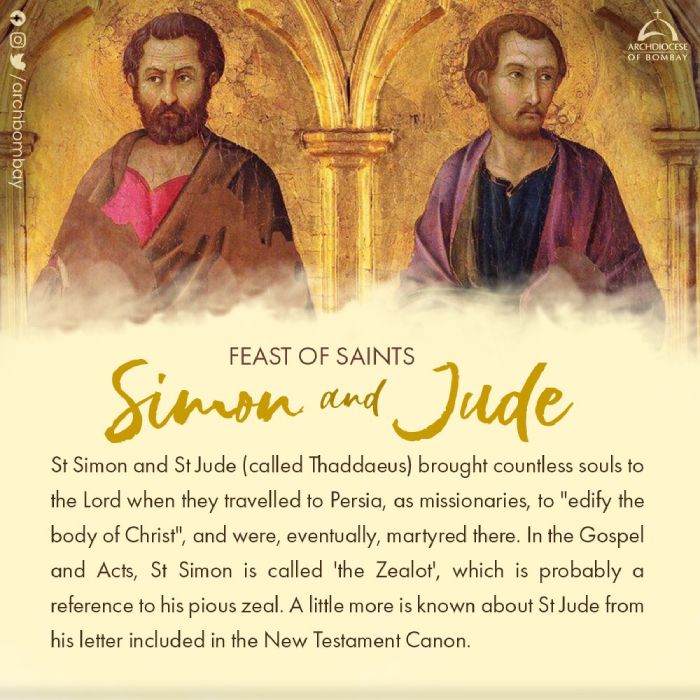28 October
Saints Simon and Jude
Apostles

Today the Church celebrates the feast of Sts. Simon and Jude whose names occur together in the Canon of the Mass and are also celebrated on the same day. Possibly this is because they both preached the Gospel in Mesopotamia and Persia where it is said they had both been sent, but in actual fact we know nothing for certain about them beyond what is told us of their being called as Apostles in the New Testament. St. Jude is the author of a short Epistle which forms part of the New Testament.
However meagre in details is the history of these glorious apostles, we learn from their brief legend how amply they contributed to this great work of generating sons of God. Without any repose, and even to the shedding of their blood, they “edified the body of Christ”; and the grateful Church thus prays to our Lord today: “O God, through the work of the apostles you have spoken your Word of love, your Son, into our world’s deafness. Open our ears to hear; open our hearts to heed; open our will to obey, that we may proclaim the good news with our lives.”
COLLECT PRAYER
O God, who by the blessed Apostles have brought us to acknowledge your name, graciously grant, through the intercession of Saints Simon and Jude, that the Church may constantly grow by increase of the peoples who believe in you. Through our Lord Jesus Christ, your Son, who lives and reigns with you in the unity of the Holy Spirit, God, for ever and ever.
Source: CATHOLIC CULTURE

28 October
St. Jude Thaddeus
Apostle
Patron: Desperate situations; forgotten causes; hospital workers; hospitals; impossible causes; lost causes; diocese of Saint Petersburg, Florida.
St. Jude, known as Thaddaeus, was a brother of St. James the Lesser, and a relative of Jesus (being nephew to St. Joseph, by his father Cleophas or Alpheus, and legal cousin to the Man-God — Jesus), Jude was one of those called by their compatriots the brethren of the carpenter’s Son. . Ancient writers tell us that he preached the Gospel in Judea, Samaria, Idumaea, Syria, Mesopotamia, and Lybia. According to Eusebius, he returned to Jerusalem in the year 62 and assisted at the election of his brother, St. Simeon, as Bishop of Jerusalem.
He is an author of an epistle (letter) to the Churches of the East, in particular the Jewish converts, directed against the heresies of the Simonians, Nicolaites, and Gnostics. This Apostle is said to have suffered martyrdom in Armenia, which was then subject to Persia. The final conversion of the Armenian nation to Christianity did not take place until the third century A.D.
In the admirable discourse at the close of the last Supper, our Lord said: “He that loveth Me, shall be loved of My Father: and I will love him and will manifest Myself to him.” Then Jude asked Him: “Lord, how is it, that Thou wilt manifest Thyself to us, and not to the world?” And he received from Jesus this reply: “If any one love Me, he will keep My word, and My Father will love him, and We will come to him, and will make Our abode with him. He that loveth Me not keepeth not My word. And the word which you have heard is not Mine, but the Father’s who sent Me.”
Little else is known of his life, but legend claims that he visited Beirut and Edessa.
He was beaten to death with a club, then beheaded post-mortem in 1st century Persia. His relics reside at Saint Peter’s in Rome, at Rheims, and at Toulouse, France.
Saint Jude Thaddeus is not the same person as Judas Iscariot, who betrayed Our Lord and despaired because of his great sin and lack of trust in God’s mercy.
St. Jude Thaddeus is invoked in desperate situations because his New Testament letter stresses that the faithful should persevere in the environment of harsh, difficult circumstances, just as their forefathers had done before them.
Therefore, he is the patron of desperate situations, forgotten causes, hospital workers, hospitals, impossible causes, lost causes, and the diocese of Saint Petersburg, Florida. He is represented as bearded man holding an oar, a boat, boat hook, a club, an axe or a book. Nearly every image of him depicts him wearing a medallion with a profile of Jesus. He usually has a small flame above his head and he often carries a pen.
We remember him October 28 in Roman Church, and June 19 in Eastern Church.
Source: Catholic Culture and Catholic News Agency (CNA)

28 October
St. Simon the Zealot
Apostle
Patron: Curriers; sawmen; sawyers; tanners
Little is known about the post-Pentecost life of St. Simon, who had been called a Zealot. He is thought to have preached in Egypt and then to have joined St. Jude in Persia. Here, he was supposedly martyred by being cut in half with a saw, a tool he is often depicted with. However, the 4th-century St. Basil the Great says he died in Edessa, peacefully.
Source: Catholic News Agency (CNA)